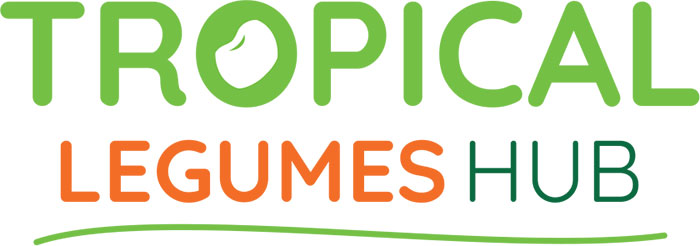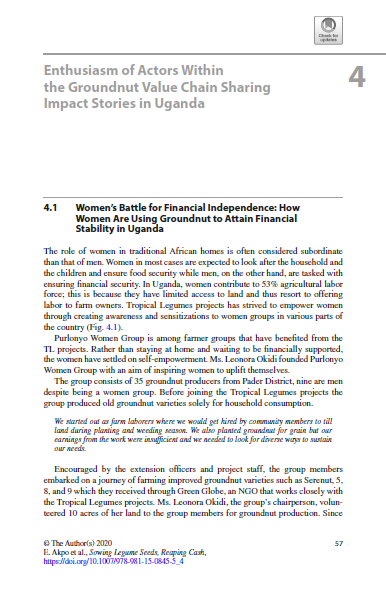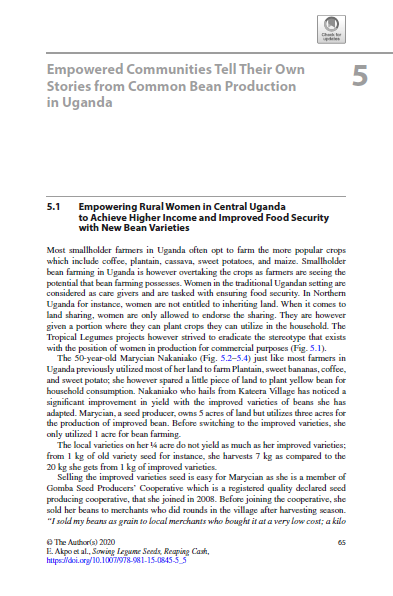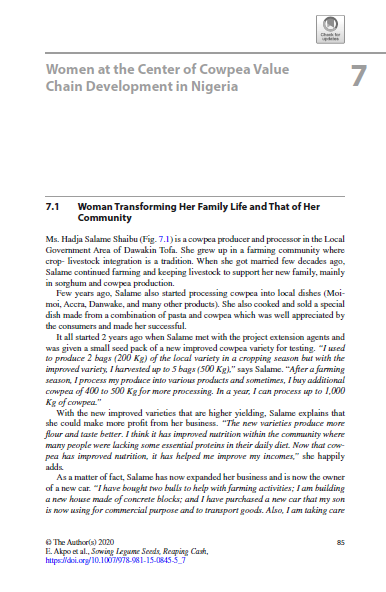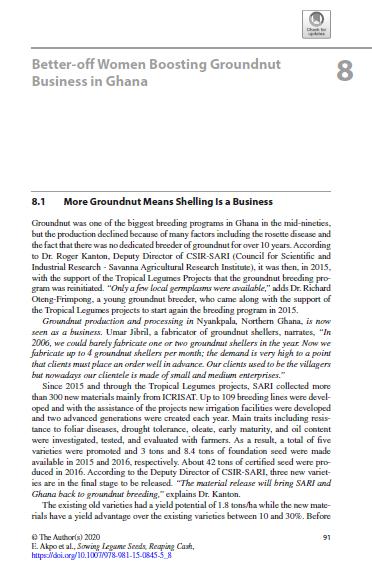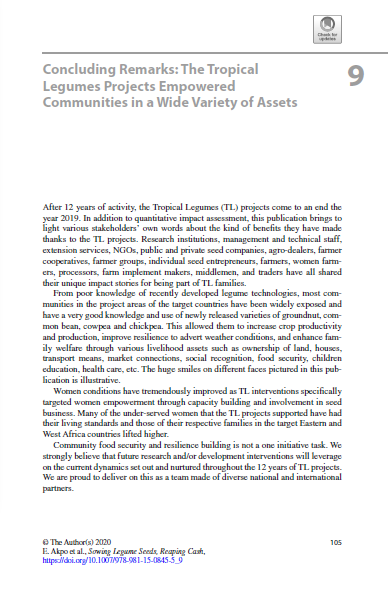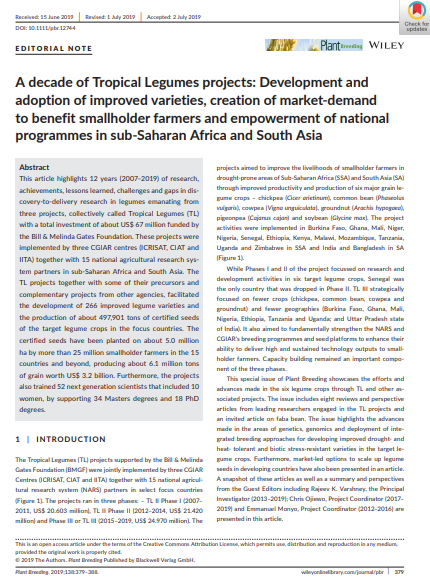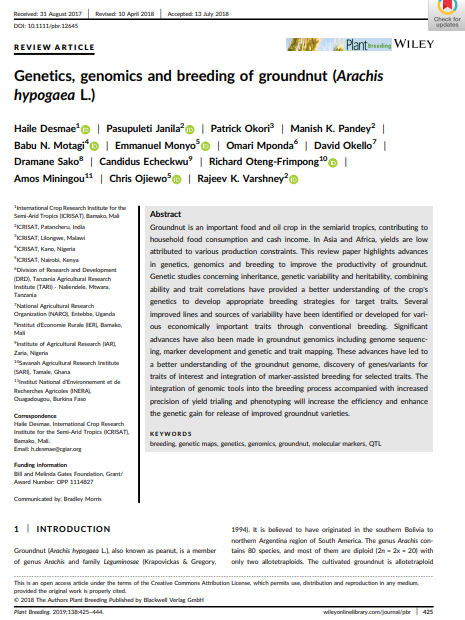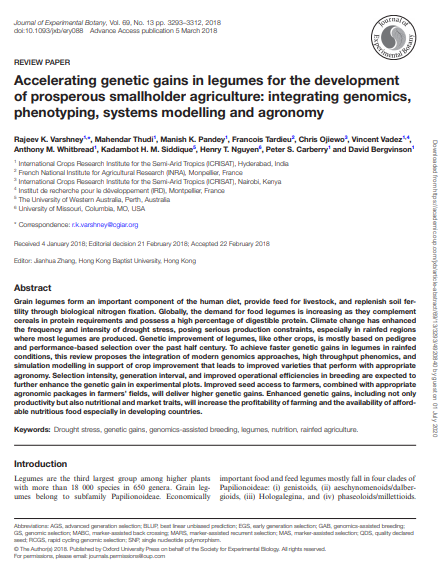Sowing Legume Seeds, Reaping Cash: A Renaissance within Communities in Sub-Saharan Africa (Enthusiasm of actors within the groundnut value chain sharing impact stories in Uganda: Chapter 4 of 9)
Chapter 4 of a book that shares impact stories and testimonies from various value chain actors who were part of the Tropical Legumes projects over the course of 12 years.
Project: TLII, TLIII
File type: PDF (767.48 KB)
Sowing Legume Seeds, Reaping Cash: A Renaissance within Communities in Sub-Saharan Africa (Empowered communities tell their own stories from common bean production in Uganda: Chapter 5 of 9)
Chapter 5 of a book that shares impact stories and testimonies from various value chain actors who were part of the Tropical Legumes projects over the course of 12 years.
Project: TLII, TLIII
File type: PDF (1.16 MB)
Sowing Legume Seeds, Reaping Cash: A Renaissance within Communities in Sub-Saharan Africa (Women at the center of cowpea value chain development in Nigeria: Chapter 7 of 9)
Chapter 7 of a book that shares impact stories and testimonies from various value chain actors who were part of the Tropical Legumes projects over the course of 12 years.
Project: TLII, TLIII
File type: PDF (661.22 KB)
Sowing Legume Seeds, Reaping Cash: A Renaissance within Communities in Sub-Saharan Africa (Better-off women boosting groundnut business in Ghana: Chapter 8 of 9)
Chapter 8 of a book that shares impact stories and testimonies from various value chain actors who were part of the Tropical Legumes projects over the course of 12 years.
Project: TLII, TLIII
File type: PDF (2.00 MB)
Sowing Legume Seeds, Reaping Cash: A Renaissance within Communities in Sub-Saharan Africa (Concluding remarks – the Tropical Legumes Projects empowered communities in a wide variety of assets: Chapter 9 of 9)
Chapter 9 of a book that shares impact stories and testimonies from various value chain actors who were part of the Tropical Legumes projects over the course of 12 years.
Project: TLII, TLIII
File type: PDF (150.11 KB)
A decade of Tropical Legumes projects: Development and adoption of improved varieties, creation of market‐demand to benefit smallholder farmers and empowerment of national programmes in sub‐Saharan Africa and South Asia
This article highlights 12 years (2007–2019) of research, achievements, lessons learned, challenges and gaps in discovery‐to‐delivery research in legumes emanating from three projects, collectively called Tropical Legumes (TL) with a total investment of about US$ 67 million funded by the Bill & Melinda Gates Foundation.
Project: TLIII
File type: PDF (668.99 KB)
Genetics, genomics and breeding of groundnut (Arachis hypogaea L.)
This review paper highlights advances in genetics, genomics, and breeding to improve the productivity of groundnut in Asia and Africa.
Project: TLIII
File type: PDF (561.50 KB)
Groundnut entered post-genome sequencing era: opportunities and challenges in translating genomic information from genome to field
A review of the optimum genetic and genomic resources that are key for accelerating the process of trait mapping and gene discovery and deploying diagnostic markers in genomics-assisted breeding.
Project: TLIII
File type: PDF
Capturing genetic variability and selection of traits for heat tolerance in a chickpea recombinant inbred line (RIL) population under field conditions
To assess the genetic variability and identify heat responsive traits in chickpea, a set of 296 F8–9 recombinant inbred lines (RILs) of the cross ICC 4567 (heat sensitive) × ICC 15614 (heat tolerant) was evaluated under field conditions at ICRISAT, Patancheru, India.
Project: TLIII
File type: PDF
Accelerating genetic gains in legumes for the development of prosperous smallholder agriculture: integrating genomics, phenotyping, systems modelling and agronomy
To achieve faster genetic gains in legumes in rainfed conditions, this review proposes the integration of modern genomics approaches, high throughput phenomics, and simulation modelling to support crop improvement that leads to improved varieties that perform with the appropriate agronomy.
Project: TLIII
File type: PDF (1.04 MB)
